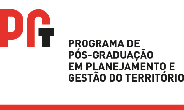Banca de DEFESA: MARCELO AVERSA
Uma banca de DEFESA de DOUTORADO foi cadastrada pelo programa.STUDENT : MARCELO AVERSA
DATE: 05/06/2023
TIME: 14:00
LOCAL: Híbrida - https://conferenciaweb.rnp.br/sala/vanessa-35
TITLE:
CONSERVATIVE LIBERAL GOVERNMENTALITY OF WATER IN THE METROPOLIZATION OF SÃO PAULO: the risk of death through water flows as a historical analysis of hydrosocial cycles
PAGES: 200
BIG AREA: Ciências Sociais Aplicadas
AREA: Planejamento Urbano e Regional
SUBÁREA: Fundamentos do Planejamento Urbano e Regional
SPECIALTY: Política Urbana
SUMMARY:
The research’s goal is to problematize the liberal-conservative rationality involved in the history of the water and sanitation services (WSS) in the formation of the Metropolis of São Paulo, within the period from 1874 to 1974. A rationality of the São Paulo water governments can be thought of, through the positivity of the discursive practices that constitute them, according to the discursive regularities of the death’s risk by water and the strategy of searching for increasingly distant natural springs, within the historical singularity in which the hydrosocial cycles of urbanization (1881 to 1949) and metropolization (1949 to 1974) are constituted. This theoretical approach is based on Foucauldian power analytics, hence it is not about performing a representation of conflicts and pointing out better or worse public policy solutions, according to certain normative or theoretical principles, but it is about questioning the power relations inscribed in the liberal conservative way of governing water access in this region. The methodological assumption is that the power relations involved in access to water are hydro-social relations whose representation is not merely derived from a system of possibility of knowledge, whether by causal, normative or historical relations, but are representations that can be said, through the problematization of how they are constituted in relation to the regime of truth that sustains them in the process of formation of the metropolitan space of São Paulo by water infrastructures. It is proposed an analytic of hydrosocial relations that consists in problematizing the formation of the concept of death’s risk by the flows of water, power and infrastructure, as a condition of existence of this discourse on water governments that, at once, emerges from the positivity of the deficient and precarious rendering of WSS in the hydrosocial cycles of urbanization and metropolization of São Paulo and regulates the rationality (the logic) of the associations between multiple objects, statements, concepts and strategies that are inscribed in the discursive and non-discursive practices of water governments. The methodology starts from the corpus of the archive formed by reports, plans and engineering projects, to place the deficit indicators of access to SAAES at the centre of the analysis, since, for example, between the 1930s and 1960s, there was a significant increase from 20% to 50% of the population at death’s risk in Greater São Paulo due to lack of access to SAAES. In a tragic imbalance between the WSS supply and demand, the water governments were constituted according to the strategy of searching for increasingly distant natural springs, as a way of defining the conduct of conducts that were guided by the regime of truth that “São Paulo cannot to stop”, to make the political economies of export agriculture coffee and import substitution industrialization feasible. Main achieved results: the narrative of this thesis constitutes itself as the main result, because it aims to problematize the way in which discursive practices are constituted and constituents of the mechanisms of power, knowledge and subjectivation, according to regimes of truth of a conservative liberal society. Indeed, it is possible to relativize that the great transformations that access to water went through as not being that great, because the formation of the space of Greater São Paulo, as a supplier centre for the other regions of the country, resulted in a governmentality whose biopolitics it was based more on letting die than on making live.
COMMITTEE MEMBERS:
Presidente - Interno ao Programa - 2140164 - VANESSA LUCENA EMPINOTTI
Membro Titular - Examinador(a) Interno ao Programa - 1516741 - JEROEN JOHANNES KLINK
Membro Titular - Examinador(a) Interno ao Programa - 2265555 - LUCIANA NICOLAU FERRARA
Membro Titular - Examinador(a) Externo à Instituição - KARINE GONÇALVES CARNEIRO
Membro Titular - Examinador(a) Externo à Instituição - JOSE ESTEBAN CASTRO
Membro Suplente - Examinador(a) Interno ao Programa - 1144005 - MARCOS BARCELLOS DE SOUZA
Membro Suplente - Examinador(a) Interno ao Programa - 1545979 - FRANCISCO DE ASSIS COMARU
Membro Suplente - Examinador(a) Externo à Instituição - RENATO ARNALDO TAGNIN
Membro Suplente - Examinador(a) Externo à Instituição - PEDRO DE SOUZA




